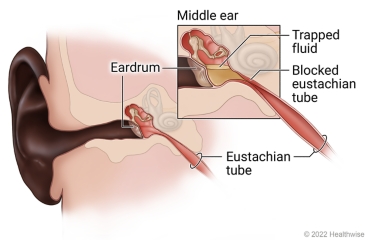Eustachian Tube Problems: Care Instructions
Overview

The eustachian (say "you-STAY-shee-un") tubes connect the middle ear on each side to the back of the throat.
They keep air pressure stable in the ears. If your eustachian tubes become blocked, the air pressure in your
ears changes. A quick change in air pressure can cause eustachian tubes to close up. This might happen when an
airplane changes altitude or when a scuba diver goes up or down underwater. And a cold can make the tubes
swell and block the fluid in the middle ear from draining out. That can cause pain.
Eustachian tube problems often clear up on their own or after treating the cause of the blockage. If your
tubes continue to be blocked, you may need surgery.
Follow-up care is a key part of your treatment and safety. Be sure to make and go to all
appointments, and call your doctor if you are having problems. It's also a good idea to know your test results
and keep a list of the medicines you take.
How can you care for yourself at home?
-
Try a simple exercise to help open blocked tubes. Close your mouth, hold your nose, and gently blow as if
you are blowing your nose. Yawning and chewing gum also may help. You may hear or feel a "pop" when the
tubes open.
-
To ease ear pain, apply a warm washcloth or a heating pad set on low. There may be some drainage from the
ear when the heat melts earwax. Put a cloth between the heat source and your skin.
-
If your doctor prescribed antibiotics, take them as directed. Do not stop taking them just because you
feel better. You need to take the full course of antibiotics.
-
Be safe with medicines. Depending on the cause of the problem, your doctor may recommend over-the-counter
medicine. For example, adults may try decongestants for cold symptoms or nasal spray steroids for allergies.
Follow the instructions carefully.
-
Be careful with cough and cold medicines. Don't give them to children younger than 6, because they don't
work for children that age and can even be harmful. For children 6 and older, always follow all the
instructions carefully. Make sure you know how much medicine to give and how long to use it. And use the
dosing device if one is included.
When should you call for help?
 Call your
doctor now or seek immediate medical care if:
Call your
doctor now or seek immediate medical care if:
Watch closely for changes in your health, and be sure to contact your doctor if:
Current as of: September 27, 2023
Content Version: 14.0
Care instructions adapted under license by your
healthcare professional. If you have questions about a medical condition or this instruction, always ask
your healthcare professional. Healthwise, Incorporated disclaims any warranty or liability for your use of
this information.